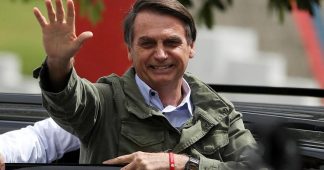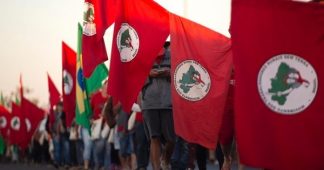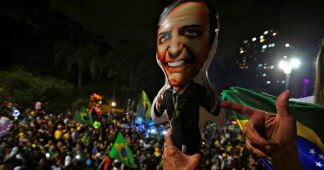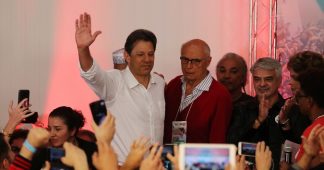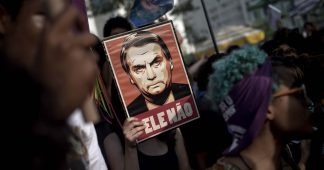by Franklin Frederick
On October 26, 2018, the Canadian news source CBC published an article (https://www.cbc.ca/news/world/brazil-canada-trade-bolsonaro-politics-foreign-policy-1.4878379) on the election of the candidate Jair Bolsonaro, reporting that:
«Jair Bolsonaro, a far-right, seven-term congressman, won Brazil’s presidential election Sunday(…)Critics at home and abroad have lambasted the former paratrooper for his homophobic, racist and misogynist statements and his support for Brazil’s military dictatorship that ruled from 1964 to 1985(…)»
«For Canadian business, a Bolsonaro presidency could open new investment opportunities, especially in the resource sector, finance and infrastructure, as he has pledged to slash environmental regulations in the Amazon rainforest and privatize some government-owned companies.»
This is just one example among many foreign news sources expressing their joy for the great investment opportunities upcoming with the election of Bolsonaro and what it represents: the possibility of exploiting the natural resources of the Amazon and the public wealth of Brazil for international capital. In the case of the Amazon, it does not matter that the world’s last great rainforest is being destroyed, creating unpredictable consequences for the climate of the entire planet. It does not matter what the Indigenous Peoples of the Amazon suffer — that their lands are confiscated, or that their way of life is destroyed. It does not matter that thousands of species of plants and animals can disappear along with the forest. After all, for the neoliberal order, Indigenous Peoples, forests and biodiversity are what economists classify only as “externalities” — meaning they have no intrinsic value and only become important if they are integrated into the international market and generate profits.
The United States is the political and ideological center of the neoliberal order and where many institutions and networks are organized to spread the neoliberal ideology. It is also the place where powerful economic groups develop their strategies to impose in other countries neocolonial administratios subservient to market interests.
One of the key institutions of the international right wing strategy is the Atlas Economic Research Foundation, better known as Atlas Network. The name Atlas is a tribute to the American writer and ardent promoter of ultra-conservative capitalism Ayn Rand and her novel “Atlas Shrugged”, published in 1957.
The story of the Atlas Network begins at the end of World War II when England ushered in a new phase of public policies that profoundly opposed the interests of the ruling class. This new phase has led, among other things, to the creation of the National Health Service (NHS), which is one of the largest and mostly free public health services in the world. It was the birth of the Welfare State. Although the Welfare State contributed greatly to the development of the capitalist economy, conservative capitalists have always tried to destroy it. The history of capitalism has many examples of capitalists trying to destroy social policies that were in fact fundamental to the long-term survival of capitalism itself. Many of the great American capitalists went against the New Deal implemented by President Roosevelt to take the US out of the Great Depression of 1929, and even attempted to organize a coup d’etat to take him out of power. The current neoliberal order represents the definitive triumph of this ultra-conservative capitalist class that fought the New Deal and continues to fight the Welfare State — with the aggravating fact that this class is currently at war against ALL society and against the planet itself.
Like many of his contemporaries, the founder of the Atlas Network, Anthony Fisher, was appalled by the ways that England was promoting free public education and health care — what an idea !!! — and discovered the solution to this terrible situation in Friedrich Hayek’s book, “The Road to Serfdom.” Anthony Fisher became an ardent disciple of Hayek and founded the Institute of Economic Affairs (IEA) in 1955, which contributed greatly to the diffusion of Hayek’s ideas and played a key role in creating a favourable climate for the election of Margaret Thatcher.
Economic historian Michael Hudson in his book “J is for Junk Economics” thus describes Hayek’s thinking:
«Friedrich Hayek’s «Road to Serfdom» (1944) argued that public planning to subsidize basic needs or regulate «the market» (rent extractors, banksters and fraudsters) to protect consumers and employees leads to socialist or fascist autocracy. His libertarian followers insist that government regulation violates their personal rights to charge whatever the market will bear. Their oligarchic alternative to big government is to roll back democratic reforms by attacking social spending programs, replacing progressive taxes with a low flat tax and sales taxes that fall on labor/consumers; abolishing minimun wage protection, Social Security and other public services; and privatizing public infrastructure to turn it into feudal-style rent-extraction opportunities. The aim is to un-tax (…) mainly the One Per Cent and eliminate the consumer protection and labor reforms put in place in the early 20 Century Progressive Era.»
Elsewhere in this same book, Michael Hudson refers back to Hayek as follows:
«Euphemistic terminology is used to popularize otherwise unpopular policies, or at least to buy time by confusing some of the injured parties. If the aim is to break labor unions, roll back wage levels and reduce workplace protection, appropriate public relations tactic is to try to co-opt labor by calling the program « labor capitalism» as General Pinochet did in Chile after his 1973 military coup, or «popular capitalism» as his admirer Margaret Thatcher did in Britain after her 1979 Conservative victory. To likewise confuse matters by crafting a false vocabulary to complement false history, lobbyists for privatization have characterized public regulation and protection of consumers as «interference» , and indeed as what Friedrich Hayek called «The Road to Serfdom» in 1944 – as if neoliberalism is not the road to neoserfdom and debt peonage.»
In 1981, Anthony Fisher began developing the Atlas Network at the request of Hayek himself, which would quickly reach global dimensions. The Atlas Network currently has 475 affiliate organizations spread across more than 90 countries.
The Atlas Network providesscholarships, training courses in leadership and supports the creation of “think tanks” to spread the free market ideology and create a favorable environment for public opinion regarding neoliberal “reforms”: privatizations and drastic reduction of the democratic sphere.
The other fundamental right-wing institution is the Atlantic Council. It is an association between large corporations around NATO, the military alliance of the West. Besides NATO itself, other members of the Atlantic Council are the US Air Force, US Navy, US Army and Defense, and the US Diplomatic Missions to the European Union and to NATO. Members of the Atlantic Council also include the German Ministry of Economy and Labor, large corporations such as Coca-Cola, Deutsche Bank, IBM and SAAB and institutions such as the Ford Foundation, Cuba Policy Foundation and the Open Society Institute.
The Atlantic Council is the institution that allows permanent interaction between the world’s largest military power and the big transnational corporations that sum up much of Western economic power. It providesits members with the means to exchange information and to do strategic planning. The Atlantic Council ensures that the natural resources essential to the Western economy— oil and ores — especially rare ores such as niobium of which Brazil is the main producer — are placed in the hands of Western transnational corporations, If a State tries to use its natural wealth for its own development and not for some transnational corporation to exploit or profit from it, it is always very effective to rely on NATO’s power to “help” to convince this State to change ist policy— or its government.
An interesting example of cooperation with the Atlantic Council is Nestlé, the largest food company and largest producer of bottled water in the world, which holds its prestigious Forum “Creating Shared Value” in a different country every year. In 2011, this event took place in Washington D.C. in partnership with the Atlantic Council. The program was limited to discussions on business opportunities in Latin America and Africa, where most of the world’s available natural resources are concentrated. In 2013, Nestlé’s “Creating Shared Value” took place in Cartagena, Colombia. In May of this year, Colombia became the first Latin American country to become NATO’s “global partner”. This example shows the interaction between the Atlantic Council, a large corporation and NATO aiming at taking over the natural resources of Latin America.
The election of Bolsonaro in Brazil was another important step in this global strategy to enclose the natural resources and public wealth of Latin America by large corporations.
But it is in Argentina that we can clearly see both the interaction between the Atlas Network and the Atlantic Council and the concrete result of the implementation of the economic policy advocated by these institutions.
Fundación Pensar in Argentina is one of the “think tanks” affiliated and supported by the Atlas Network. The PRO party for which President Mauricio Macri was elected in 2015 is practically an unfolding of Fundación Pensar. Members of this institution were appointed to hold important positions in his government. In September of this year, the Atlantic Council awarded its “Global Citizen Award” to President Macri “for his untiring efforts to renew Argentina’s role as a crucial player on the global stage” — as the Atlantic Council reported — “The Award was given to the President Macri for his commitment to put Argentina on a sustainable path, realizing the promise of a prosperous future for the Argentine people. (…) In his three years as President, Argentina has once again become a key player in the region and a world leader (…)”
Notwithstanding the Atlantic Council propaganda, the reality about Argentina and the Macri government is something very different and the combined power of the Atlas Network, the Atlantic Council and the subservient mainstream press could not hide from the world the economic disaster in Argentina
After completing 721 days of government, Argentina’s Coordinator against Police and Institutional Repression (CORREPI), published a report denouncing at least 725 deaths caused by Stateviolence. One dead person every 24 hours due to the violent repression of the new government. CORREPI’s report described President Macri’s government as one of the most repressive in Argentinian history — an impressive feat considering that Argentina suffered one of the most violent military dictatorships in Latin America.
Argentina’s current situation is: economic contraction and high inflation, abusive increases in the prices of gas and electricity, massive unemployment in the public sector, cuts in the budget for health care, education and science, and a devaluation of over 50% of the peso in relation to the dollar. The Macri government has faced great resistance from the population such as strikes and demonstrations in the streets. The government resorted to the IMF for a loan that did not bring the promised investments to Argentina and the economy did not recover. Several public goods have already been privatized and others are awaiting the same fate. And while popular discontent and demonstrations on the streets increase, the Macri government’s response was to increase repression by decreeing in July this year that the military can intervene in internal security — something that has not happened since the end of the military dictatorship. But this is the truth about the Atlantic Council’s “Global Citizen” and the great example of Atlas Network flagship President Mauricio Macri. After three years of his government, Argentina is literally on the brink of chaos.
As the forces behind Macri are the same forces behind the newly elected President Bolsonaro, we can expect Brazil to have a similar future as Argentina. Brazil will have a government more concerned with selling its wealth and oppressing its people than in building a nation.
Let’s be clear: the international neoliberal order that has done so much to elect its candidate Bolsonaro in Brazil aims to subject the whole society to the dictates of the market. Its final goal is to transfer global wealth to the hands of less than 1% of the population — multi-millionaires, who are the core of neoliberal power. For the rest — all of us — despite rhetorical statements to the contrary, there is not much left, not even our humanity. For only those who incarnate and defend neoliberal ideals have the right to be considered “human” and “rational.” Those who oppose, who resist, who point out other ways, are robbed of their humanity and of reason, disqualified and demonized — all to be more easily fought and exterminated.
To fight against the neoliberal order is to fight for our humanity, for the integrity of our society and for the future of the planet itself.
Translation: Tamanna Kohi
